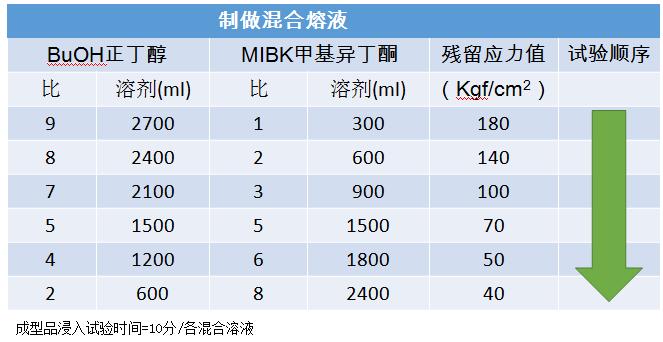Troubleshoot
PC stress cracking detection and countermeasures
PC stress cracking detection and countermeasures
- PC in the process of forming due to shear stress, after cooling shrinkage will leave residual stress.
- Excessive freezing strain leads to cracks and deformation of the product. Forming pressure should be selected as far as possible in the allowable stress, the best in 7.8~9.8MPa below.
- In addition, cracks may also occur during coating, bonding and machining due to the action of solvents.
I. Stress cracking detection (soaking chemical method)
Principle: Soak the molding product into the mixture of BuOH-MIBK, promote the crack occurrence, from the mixing ratio of BuOH-MIBK when the crack occurrence of the molding product, obtain the equivalent residual stress value.
This test is to measure the residual stress inside the molding product. According to the molding machine, the residual stress is inevitable. According to the different forming conditions, the residual stress exists to destroy the molding product. The reason is that the partial shrinkage difference of the molding product is not equal to the pressure at the time of injection, which is considered to be the main cause of residual stress.
BuOH: MIBK mixing ratio and equivalent residual stress

● lime light
- Not suitable for cracked forms.
- Resins other than PC are not suitable.
allowable stress
Microcrack or cracking occurs when plastics are used for a long time under the action of stress above a certain value. The maximum stress that does not produce this phenomenon even after long-term use is called allowable stress. The size of the value varies depending on the temperature used.
Allowable stress is the maximum stress that can be applied to the material under the condition that it can remain safe in use, that is, the maximum stress that is allowable in design. The allowable stress also varies with the type of stress and is usually determined by the test results of the material, service conditions and experience.
Because the allowable stress is the maximum allowable stress in the use of materials, a certain safety factor should be considered in the actual design and use.
II. stress cracking countermeasures
annealing treatment
For general parts, the residual stress is not very high, no annealing. And the annealing method can not remove most of the residual stress, because it is still in the glass state temperature, cold flow property and creep property are poor. Annealing will also reduce some mechanical properties such as toughness.
Annealing treatment is mainly for those parts with thick walls, complex shapes, metal inserts, cold machining, the use of temperature environment is particularly high or very low, these parts are usually large residual stress or need to resist harsh environment.
Annealing method
- The annealing method is to place the parts in a hot air oven or infrared furnace for slow cooling. Annealing temperature is 100~120℃, below 100℃ post-treatment effect is poor, higher than 120℃ or too long time, will make the parts discoloration or other problems, heat treatment time according to the wall thickness of the parts.
- Although residual stress, like other thermoplastic resins, can be alleviated by heat treatment, in order to minimize residual stress, should also be from the product design, mold design, molding to give full attention.
Annealing condition (standard) 120℃ x 1~2 hours
※ The temperature after removal from the box should be less than 40℃
※ It should be noted that after annealing, the product should be smoothed out to let it cool naturally, and the method of rapid cooling can not be taken
※ The thicker the product, the longer the annealing time and the slower the cooling rate after annealing. Please increase the annealing time according to the thickness of the product.
Copyright ©2020 Polymer Solutions Limited 粤ICP备2020087627号
